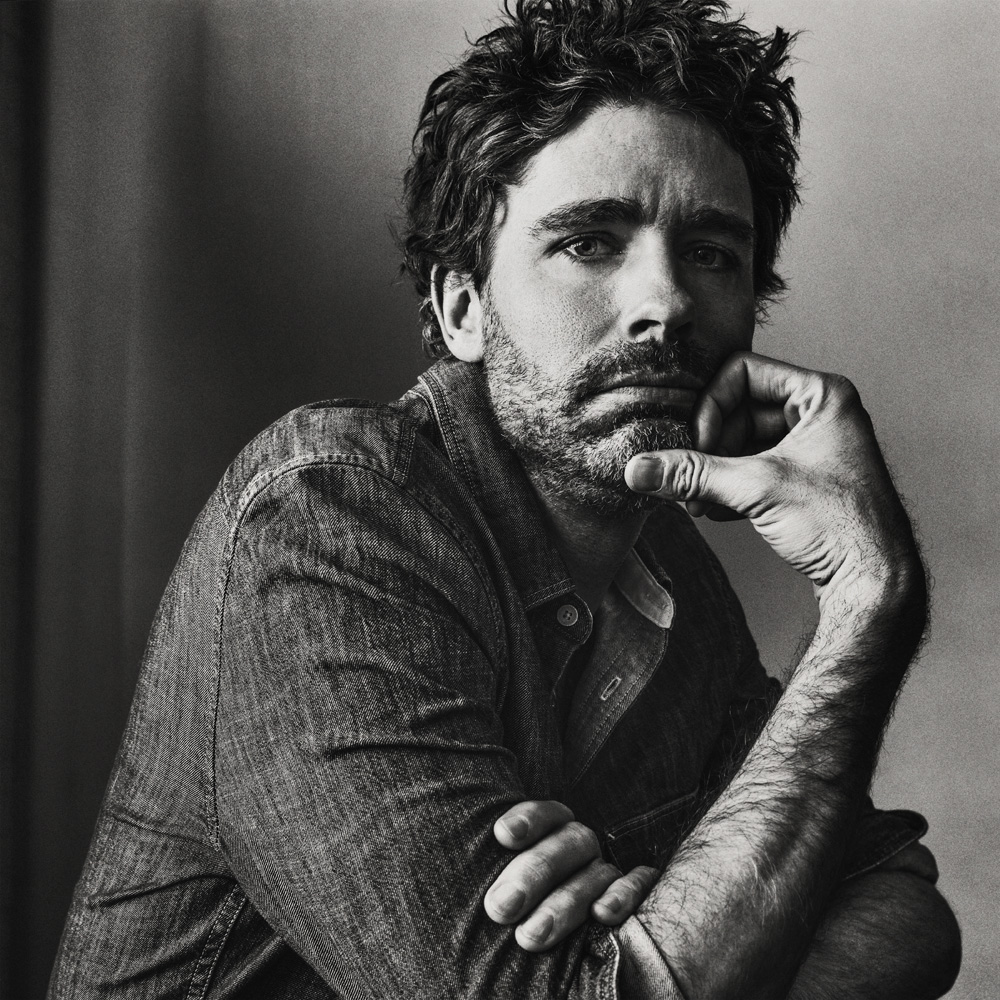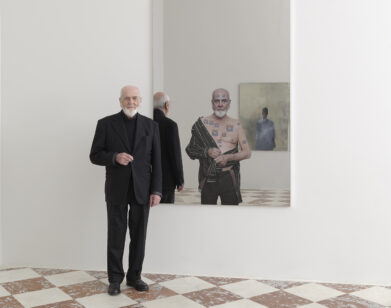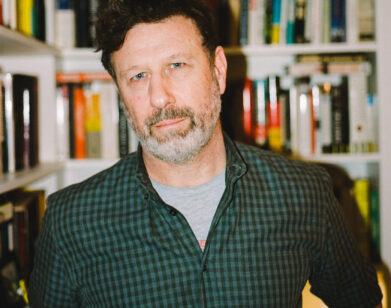Joshua Ferris


ABOVE: JOSHUA FERRIS IN NEW YORK, MARCH 2014. SHIRT: 7 FOR ALL MANKIND. GROOMING PRODUCTS: CHANEL, INCLUDING LES BEIGES HEALTHY GLOW SHEER COLOUR SPF15. STYLING: VANESSA CHOW. GROOMING: JOHN MCKAY FOR CHANEL/DE FACTO. PRODUCTION: DAYNA CARNEY/ MANAGEMENT + ARTISTS.
You’re tailoring and curating your own identity to match some ideal notion that can’t be achieved through the spontaneous self. We’re interacting with each other in shiny homepages. I don’t think that makes for honest communication. Joshua Ferris
“Trapped inside all day telling people to floss didn’t always eliminate the fleeting sensation of being alive.” So observes Joshua Ferris’s hapless dentist protagonist in his new novel, To Rise Again at a Decent Hour (Little, Brown). The 39-year-old Ferris has a gift for isolating the existential dread that lingers in the sanitized, temperature-controlled air of offices and homes. His characters aren’t masters of the universe; often they aren’t even masters of themselves. His first novel, 2007’s Then We Came to the End, was a brilliant first-person-plural groupthink on the highs and lows of an advertising firm that read like Kafka on nitrous oxide. His second novel, 2010’s The Unnamed, framed a far bleaker suburban nightmare of a man literally unable to stop himself from walking away from his family and job. His latest book returns him to the comedy of the workplace—a successful Manhattan dentist office run by Paul O’Rourke, a confirmed atheist, about everything but the Red Sox, and an insomniac, technophobic loner who is surrounded by his assailing all-female staff. Paul’s life soon turns upside down when his identity is hijacked online, and whoever is behind his new Twitter feed and business website is preaching the message of the obscure religion of the Ulms, a faith-based group founded on the principle of doubting God. If Ferris’s novel is a conversion story, it’s more Paul to Saul than the other way around—how a man fell off his horse by not seeing the light. But maybe the fall is the more valuable lesson anyway. Ferris’s writing is so fresh and mordant—a comedian’s sense of timing mixed with a social critic’s knack for shaking the bushes—that he manages to tackle religion and technology without robbing his readers of the clever incidentals of a man who cleans mouths for a living. I met up with Ferris in SoHo for lunch. He had just come back from a trip to the end of the world.
CHRISTOPHER BOLLEN: I hear you just came back from Antarctica. Did you take a boat from Argentina?
JOSHUA FERRIS: Yes, from a town called Ushuaia. I took a ship that I heard about from a neighbor. He had just come back and told me about it, and at the time I happened to be reading a ton of books on Antarctica, just out of curiosity. I had seen there were cruises, but they were all too expensive. This boat I went on is called the Europa, and the reason that it’s relatively cheap is that it’s a teaching sailboat. So you participate in sailing it. You have to work—at least when you’re not seasick. I was seasick a couple days.
BOLLEN: Do you get your own cabin?
FERRIS: No, you have to share bunks and you’re really squeezed in. It’s four guys and one toilet seat—pretty grim math. But the part that I hated the most is also the part that I really loved the most, which was the actual sailing. Because it was rigorous and uncomfortable and more work than I was prepared to do. Sailing is a 24/7 enterprise. You have night watch. But at the end of it, there was a wonderful camaraderie that developed over the course of those three weeks. It was rewarding.
BOLLEN: What about actually reaching Antarctica? What was that like?
FERRIS: It’s so extraordinarily beautiful and rare and stark, and unlike anywhere else in the world. It would be instantly colonized and commercialized if it were hospitable.
BOLLEN: Did you go on this trip as writing research?
FERRIS: Yeah. I could have written a story on Antarctica without going there, but I wanted to see how much information and firsthand experience I could pick up and integrate into a story. I really wanted to find out what the payoff was, with respect to real experience.
BOLLEN: In terms of lived experience, you actually worked in advertising, before your first novel, Then We Came to the End. Did you do any research on a dental office for To Rise Again at a Decent Hour?
FERRIS: I did research. I read books. What I found very useful for some of the more visceral details was watching YouTube clips. There are a lot of instructional videos on there for dentists—so you can see how a dental dam is inserted, or sutures and things like that.
BOLLEN: So you didn’t go to your own dentist?
FERRIS: I went to my own dentist and asked some questions. I also knew a dentist who would answer questions.
BOLLEN: You actually know a dentist your age? I don’t. Not a single one. I know doctors, teachers, artists, magicians, even, but not a single dentist my own age.
FERRIS: I had a friend whose father was a dentist. But you’re right; they’re not too common. It’s weird—when I see a dentist, my imagination really runs wild.
BOLLEN: A phenomenon you captured so well in the novel is the way a patient actually gets a front-row seat for the power dynamics that go on between a dentist and the hygienists. There’s obviously a hierarchy in all medical offices, but unlike with a regular doctor, where the nurse comes in but leaves before the doctor enters, the dentist and his assistants are all forced into the same room and come in constant contact right over the patient’s head. It’s a very different medical encounter.
FERRIS: I think the casualness and familiarity of the dentist somehow devalues the role in our minds as opposed to someone like a doctor. Or maybe because the dental hygienist does quite a lot of work. And it’s true that they work in tune. I love my dentist because he has an extremely foul mouth.
BOLLEN: Really? Mine is so kind and well-mannered. He’s in the Chrysler Building.
FERRIS: Mine drops a lot of curse words during the exam. And the dental hygienist is extremely professional. She always apologizes for him.
BOLLEN: [laughs] So why did you pick a dentist as the occupation for your main character? Is there something about the job—like how they’re basically human mechanics?
FERRIS: I like that. Yeah, you raise the roof of the mouth much like you raise a car hood. You know, there are a lot of trappings about the dentist that could have been motivating factors. Like how they have the highest suicide rate in the country—
BOLLEN: They do? Why?
FERRIS: I’m still not sure. I think they’re loners. And some don’t get a whole hell of a lot of respect. People don’t want to see them. It’s almost a primal thing. People do not want to see their dentist, so their days are filled with a form of grief. As I write in the book, they are, at best, a colossal inconvenience. And I think that must have some impact, which is tied up in so many ways with their identity. Their livelihood, their reason for going to work, is scorned by most of the people they’re helping.
BOLLEN: And no one ever wants to follow the dentist’s advice. Like, enough with the flossing lecture.
FERRIS: Yeah, they’re talking into a vacuum. And yet they’re so fully aware of the dangers of not following their advice. That makes the frustration compounded. They seem like a Francis Bacon painting, like they’re calling out in despair everywhere they go. And yet they’re only trying to help us. That is certainly operating in my character Paul. He himself is searching for ultimate answers that can only be answered by the most mundane human ones like: “Just floss and you’ll live longer.” Some of these questions about the existence of God and the possibility of an afterlife will never be answered, so asking those questions are almost the wrong questions. The ones we should be asking are things like: How can we improve our health? Or how can we help out those who are less fortunate? Paul can do that. As a dentist, he can go abroad and help kids who can’t floss or brush. Or he can do that by going in every day and rolling the rock up the hill, trying to get his patients as healthy as he can be despite the fact that they don’t want to hear that. So there’s a kind of despair at the heart of the dentist that I wanted to get at. And the nobility—the fact that you can feel ennobled despite the fact that there is neglect and rot and decay all around you. The other reason is because it got right into these questions of mortality and frustration and decay. Because the dentist is right in the middle of it all, with his fingers in the mouths of his patients.
BOLLEN: Your first novel took place in an office—so work was the subject of the book. In your second novel, your main character was a lawyer, which had an impact in his predicament. In this book, dentistry plays a vital role. Are you a writer who feels that an occupation plays a significant role when forming a character’s personality and dimensions?
FERRIS: I have a very easy time reading a novel and hearing that the main character is a tollbooth operator or a heart surgeon or a lackey in a political campaign or whatever the case may be, and not having to hear a whole hell of a lot about the profession. But it would be very hard for me to create a novel in which a character’s job was incidental to their identity. Partly because my job is so crucial to my own identity. I wake up every day in order to do something that’s quixotic, and not necessarily called for in the world, but I do it because there’s extraordinary meaning for me behind the effort. I’m not sure that I want to write a book about someone who doesn’t take life seriously in that manner. And therefore the books are about work.
BOLLEN: You just talked about how a dentist can go to poorer countries and make a tangible difference. Dentistry is a tedious job, but it’s incredibly valuable. A fiction writer, however, has a job that might seem magnanimous on an abstract level, but offers very little in terms of skills that can be applied to aid. I guess writers could work as tutors. But I’m curious about the ways in which fiction writers think they’re serving humanity.
FERRIS: I think a fairly common behavior among writers is that they want to help. They’re generally charitable people. They’re interested in the world. They’re curious, they’re empathetic. They understand suffering. They don’t turn away from that. But what they do is essentially useless. Except for the sake of the thing itself. It’s an interesting dynamic that this over-riding preoccupation to get back to the page also happens to coincide with our continued irrelevance in the world. It’s a great and frustrating contradiction. Because I think writers do want to make an impact on the world.
BOLLEN: Perhaps that’s why fiction writers so often tend to be college professors. But you know what’s interesting? Most people, when they list their dreams, say at some point, “I’d like to write a novel before I die.” But they rarely ever say, “I’d like to write eight novels before I die and sit year after year locked away in a lonely room trying to make that happen.” There’s a sense that one novel seems fulfilling, but devoting 30 years to the occupation is lunacy.
FERRIS: Yeah, it’s a pathology. This is the thing that I think is so striking: for the most part, writers are a good lot. But they’re really sick. To want to write eight novels alone in that room is sick. Philip Roth has a nice equation for this in American Pastoral, where his character says: “As pathological phenomena go, it doesn’t completely wreck your life.” That seems fairly accurate.
BOLLEN: Right. Maybe it’s a place to put your pathology instead of a more destructive outlet. Do you think you’ll always write fiction?
FERRIS: It’s an interesting thing, what happens as a writer grows older. Maybe some of the endless possibility starts to get narrowed down, maybe some of the natural propensity for truth and fact somehow expands. You hear all the time that by the time men hit 60, all they read are biographies and the occasional narrative nonfiction book. And I think there is a weird thing that happens; as we get older and we seem to recognize the important things.
BOLLEN: What does that mean for fiction?
FERRIS: It’s like what it says in the Bible, I think for men around our age, it’s time to put away childish things. And maybe fiction is one of the first things to go. The thing is, for me, as a fiction writer, I don’t think there’s a finer testament to our lives than this thing that’s being spurned—the emotional intelligence, the ethics, the beauty. It’s all there. It’s all so fully contained in a novel that succeeds. But at the same time, I understand the impulse to put away childish things. The way it translates for me is I will start to leave some of these more highly imagined worlds for things that hit a little bit more autobiographically. That’s how it will translate for me, going forward, I think. My next book probably won’t be about somebody that I have not been in my life.
BOLLEN: Your books couldn’t possibly be more different than each other. Was that deliberate? Did you purposely avoid a single authorial style?
FERRIS: It just comes down to intuition, to where I want to go. That restlessness is ingrained. I can’t do anything to stop it. The intuition that determines what I’m doing is independent of my own more calculating or canny assessment of what I should be doing. Hopefully, by the end, if I have those eight books, if I spend those years in a room, what you will see is a continuum, and you see the connecting threads that are very hard to discern after book three.
BOLLEN: So it won’t just be a compendium of pronouns—first book, first person plural; second book, third person singular; third book, first person singular … The fourth book must be second person plural.
FERRIS: Hopefully not. [laughs]
BOLLEN: Let’s talk about God. Because that’s really what the search in To Rise Again at a Decent Hour is at its root, although it’s cleverly modulated through all of our social-media technology, which the narrator is phobic about. At the beginning of the book, he’s phobic about God and technology, actually. How do you see those two vastly different realms interacting?
FERRIS: I think the internet takes a lot of the anxiety of life away. It’s a kind of deity. You’re never lonely. You’re always distracted. If you spend enough time on it, there’s not really that nagging sensation of existential despair; it erases it very effectively. And it’s monolithic. And thanks to it, we’ve got the ways to linger there after death—your blog exists afterwards, your e-mail exists afterwards. And to watch people on their smart phones is astonishing. It’s a new way of living. And that new way of living is so thoroughly absorbed that a lot of the quiet desperation goes away—either because you’re looking at scores or something far more self-directed. Whatever the case may be, you’re entertained, you’re taken care of. And so I started wondering, “Does that actually constitute a community? Is it a sufficient community? Does it really take care of the religious question?” I don’t think it does, because you have to make a final step in order to really take care of that anxiety, to make yourself feel as if you’re immortal. And I don’t think that final step can be found on the internet.
BOLLEN: What’s interesting about Paul’s situation is that he opts out of having a presence on social media. But doing so leaves him vulnerable to someone stepping in and claiming his identity. It’s almost like you have to establish your own identity online to ensure that you remain yourself.
FERRIS: Yeah. Somewhere along the line between the time I first started working in advertising in 1998 and now, the word brand has replaced identity. We are no longer individuals so much as we are brands. We’re individual brands. Individuals are basically left to define their individuality by staying off the internet, which in and of itself can be a brand, the opting-out brand.
BOLLEN: Maybe it’s a problem of nomenclature. Maybe if there were a better word than brand, it wouldn’t sound so cheap or self-promotional.
FERRIS: Right. It implies a brand manager, a commercial product. It implies calculation as opposed to spontaneity. It prefers message over conversation. If you think of a person as a brand, their own willing commodification of themselves is not liberating. It’s not what they want, I don’t think.
BOLLEN: It also turns your life not only into a lifestyle, but a job.
FERRIS: It’s because you’re tailoring and curating your own identity to match some ideal notion that can’t be achieved through the spontaneous self. We’re no longer dealing in the world of the real in a truthful way. We’re interacting with each other in shiny homepages. I don’t think that makes for honest communication.
BOLLEN: But what’s interesting about who eventually took over Paul’s brand is that they kind of went off-brand by claiming that he was part of this esoteric religious group.
FERRIS: I didn’t want to demonize the internet in the book. I don’t actually think of the internet as the bad guy. I think of the internet as doing a hell of a lot of wonderful, fascinating, interesting things. A lot of information that’s exchanged on the internet is extremely useful, and every once in a while it percolates up to knowledge. Wisdom is far harder to come by.
BOLLEN: Were you raised in a religion?
FERRIS: I was raised in lots of different religions. I say to my mother that I suffered from multiple denominations syndrome, because we seemed to go from denomination to denomination. My mom went through some divorces. With every new stepdad, we seemed to go through a different denomination. With every new divorce, we seemed to go back to the Catholic Church.
BOLLEN: Did that mean that you ended up not believing in much?
FERRIS: No, not much at all.
BOLLEN: I grew up Catholic. And my grandparents had a lot of Catholic pride in them. But Catholicism isn’t a race. However, I remember when I was in college that there was a lot of discussion on whether Judaism was a religion or a race. And you bring this debate up in the novel. Is the defining characteristic of a group that they have a shared belief in God, or is it a series of customs and rituals—is it in—born or can you opt in?
FERRIS: They’re fascinating problems, and if I were Jewish, I would be thinking about them constantly. Even as a non-Jew, I thought about them constantly when I wrote this book.
BOLLEN: How did you go about constructing the religion of the Ulms? It’s not easy to invent a religion. I actually didn’t know that Amalekites existed until your book. I had to look them up on the internet.
FERRIS: I wanted to write a book about a religion and not a cult. And that’s a big distinction, because a religion is rooted in foundational text, like the Bible. The three monotheistic religions we have with us now are all founded on the Hebrew Bible. They all share characters and they share stories. In some instances, they share the entirety of what Jews call the Hebrew Bible and what Christians call the Old Testament. I knew I had to take from it as well if I wanted to write a book about a religion, and not a cult. Otherwise, it would just be something that my character could easily dismiss as stirrings of a mad man. The Amalekites are interesting because they are still technically at war with the Jews—they will always be at war with the Jews.
BOLLEN: It’s hard to form a religion based on doubt without making it almost seem like Satanism. It’s the trick of the book: to doubt the god you believe in is to serve him.
FERRIS: Yeah, and there are these interesting things now called atheist communities, like, atheist churches. They are devout atheists. And they make customs and rituals that mirror customs and rituals of established religions. And they bring people together and establish a community that would otherwise not exist, because of their shared belief. Their shared belief being, essentially, negative in character. It brings them together through these ad hoc rituals that they hope will, over time, become so engrained into the community.
BOLLEN: Two of your novels are comedic—Then We Came to the End and To Rise Again at a Decent Hour. Do you find yourself a natural comic writer? Or does it take immense effort to write funny?
FERRIS: I think comedy is so much easier to do on the page than it is in real life. When I’m writing, comedy is an easy way to win over the reader. You’re automatically more disposed to keep reading, thinking maybe, “I’ll get another laugh or two.” I think it’s a survival instinct in me. I mean, you don’t want to lose these guys within five or ten pages. You want them to keep going. I think to some extent it’s a desperate measure that I throw out there, because a novel isn’t a complete waste of time if it made you laugh.
BOLLEN: A writer friend said to me that comedy is a better character-builder than tragedy because it’s hard to trust a character who immediately waxes profound or serious—just as it is in life. You have to build up to those more soulful glimpses.
FERRIS: Comedy is like fictional charm. It’s the charm of fiction. Or the charisma of fiction. When you meet somebody who’s immediately charismatic, you’re attracted to that person. And in fiction it’s got to come out in either one of two ways: in the prose itself, which is like Nabokov’s prose, full of charm and winning and beautiful, and you’re hooked immediately because you never want to leave such a colorful and penetrating world. Or, on the other hand, it’s simply being a funny writer. There are a lot of funny writers that don’t even aspire to whatever we might want to call literature. But you still don’t want to leave their company, even if you don’t somehow elevate them to some form of greatness.
BOLLEN: Do you think comic novels ever have a shot at greatness? Historically, it seems like comic novels tend to get forgotten.
FERRIS: Take two books published in the early 1960s—Catch-22 and Revolutionary Road. In literary circles, Revolutionary Road is always going to come up more frequently than Catch-22. I think the reason doesn’t have to do with the difference in the topics and themes so much as it has to do with whether or not it’s funny. Being serious is serious business in fiction. It’s commercial or hoi polloi in fiction to be funny. It’s too accessible to the great unwashed.
BOLLEN: Which is odd because I think it’s harder to write funny.
FERRIS: Here’s what the greats do—they’re always very serious, but they slip in the humor. So the book somehow doesn’t become a comic novel; it becomes a novel that also happens to be funny—like Lolita or Pale Fire or The Great Gatsby. The Sun Also Rises is a deeply serious novel about the post-World War I generation but it’s very funny. Roth is very funny, DeLillo is very funny. But their main preoccupation is not with being funny; their main preoccupation is with glove makers in Newark or buyers and sellers of waste.
BOLLEN: Maybe comedy doesn’t become a classic because jokes tend to date.
FERRIS: The people who are writing these great novels that are also funny, their humor is almost always situational. The humor that people tend to read voraciously is far more topical and nonsituational so it’s that more glancing irony or sarcasm that doesn’t stick. But Catch-22, for example, and the world he constructs inside of the book allows the humor to still apply 50 years later. It doesn’t date, because it generates its own punch lines.
BOLLEN: You have an impressive ability to keep a voice alive—which is harder than it reads. Do you find yourself angst-ridden when you stare down your computer screen in the morning?
FERRIS: No, it’s not angsty. If it were angsty, I’d probably give up. I’d probably think by this point in my life, I have a wife, a kid, a mortgage, and 40 is just right around the corner, and my parents are getting older, and putting away childish things does seem like the right move. I would think, “I don’t want to golf for a living.” Golf is nothing but impossibility. And when I go out golfing, I’m so irritated by my inability to golf that I give golf up. I don’t want to do that for a living. This should be pleasurable. This should, at the very least, be neutral with respect to my own psychosis. And usually most days it alleviates, it calms the voices and gets me feeling as if I’ve mentally been on the treadmill for three miles.
BOLLEN: You don’t feel any self-hatred? There isn’t a ruler-slapping piano teacher in you when you’re writing? Or Romanian gymnastics coach?
FERRIS: That person’s there, for sure. But not so much anymore. It’s not self-flagellation. If it’s not good, I recognize that, by now, I have enough faith that, over time, things find a way of smoothing out and becoming better than what they once were. I know this is a trite metaphor, but it’s a little like having a son. I have a son. He’s 4. And being the father of a four-year-old, you recognize that the human being takes extraordinary work to refine. I do have faith that sooner or later this complete heathen, this madman who lives entirely in an insane asylum of his own mind, will sooner or later become some portion of a productive member of society. You have to play the long game with fiction and have faith that, over time, somehow civilization will take place.
BOLLEN: I’ve always thought a good indicator of civilization taking hold of a child is when they become ashamed of their own poop. You should be embarrassed and ashamed of this natural product coming out of your body.
FERRIS: Yesterday, my wife was getting a haircut, so my son and I went and got hot chocolate. His face was just clown lips of hot chocolate, and we stopped on the street, and there was a mirror outside a store, and I said, “Will you look at yourself!” He feels the mustache of hot chocolate, and he just starts to laugh, and he turns away and says, “Papa, can we go into the toy store?” Total oblivion. What I was trying to figure out was, is he self-conscious? He was not. I want that to last as long as possible because it’s a beautiful thing.
TO RISE AGAIN AT A DECENT HOUR COMES OUT TOMORROW, MAY 13.
CHRISTOPHER BOLLEN IS INTERVIEW‘S EDITOR AT LARGE. HE IS ALSO A FICTION WRITER. HIS SECOND NOVEL, ORIENT, WILL BE RELEASED BY HARPERCOLLINS IN EARLY 2015.






